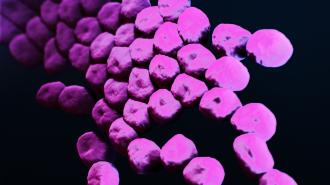A new antibiotic targeting a “superbug” resistant to nearly all available drugs has proven effective in mice. The drug works in a wholly unique way, and if it proves effective in human trials, it could lead to an entirely new class of antibiotics.
Antibiotic resistance: The accidental discovery of penicillin in 1928 was a turning point in modern medicine — prior to it, there was no effective way to treat bacterial infections, which meant something as small as a scratch could lead to deadly blood poisoning.
We could be destined to return to that scary era in history, though, as decades of misuse and overprescribing have given bacteria time to evolve resistance to existing antibiotics, rendering them ineffective. In 2019, these superbugs were directly responsible for 1.27 million deaths, and experts predict the situation could get far worse in the future.
A new antibiotic: Antibiotic resistance has made the development of new antibiotics a top priority for the medical community, and scientists from Swiss healthcare company Roche and Harvard University have now shared promising news on that front.
In a pair of papers published in Nature, they detail the development of a new antibiotic, called zosurabalpin, that is effective against CRAB (“carbapenem-resistant Acinetobacter baumannii”) — one of WHO’s top three “priority pathogens” in the battle against antibiotic resistance.
“This is the first time we’ve found anything that operates in this way.”
Michael Lobritz
When tested in mouse models of three types of CRAB infections (sepsis, pneumonia, and an infected thigh wound), zosurabalpin reduced the amount of bacteria for all three and improved survival rates for the mice with sepsis.
The new antibiotic also proved to be safe and tolerable in two completed phase 1 clinical trials, involving a total of 64 people, according to a summary shared by the research team. Other phase 1 trials are ongoing.
How it works: CRAB belongs to a class of microbes known as “gram-negative bacteria.” These have an outer membrane that protects them from the environment and that can evolve to make the bacteria more resistant to antibiotics.
CRAB’s outer membrane is made of large molecules, called lipopolysaccharides. Zosurabalpin blocks the proteins that carry these molecules from CRAB’s inner membrane to its outer membrane, and the build-up of lipopolysaccharides inside the bacteria ultimately kills it.
“This is the first time we’ve found anything that operates in this way, so it is unique in its chemical makeup and mechanism of action,” Michael Lobritz, head of infectious diseases at Roche Pharma Research & Early Development, told the Guardian.
“You could imagine tweaking the chemistry to address other targets.”
Michael Lobritz
Looking ahead: Treatments that work in mice often fail in people, so more clinical trials are needed before we’ll know for sure that this new antibiotic is effective against CRAB infections.
If it is, it could become the first new antibiotic approved for use against gram-negative bacteria in more than 50 years — and maybe even lead to the development of other drugs targeting more superbugs in this class.
“We discovered a new way of killing bacteria,” Lobritz told the Financial Times. “You could imagine tweaking the chemistry to address other targets.”
We’d love to hear from you! If you have a comment about this article or if you have a tip for a future Freethink story, please email us at [email protected].






